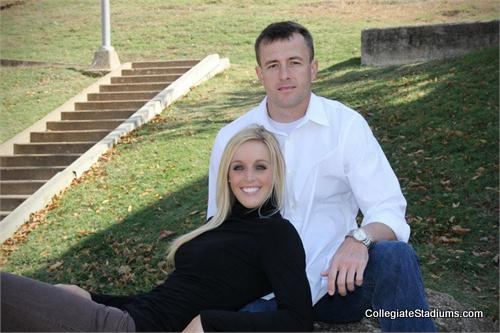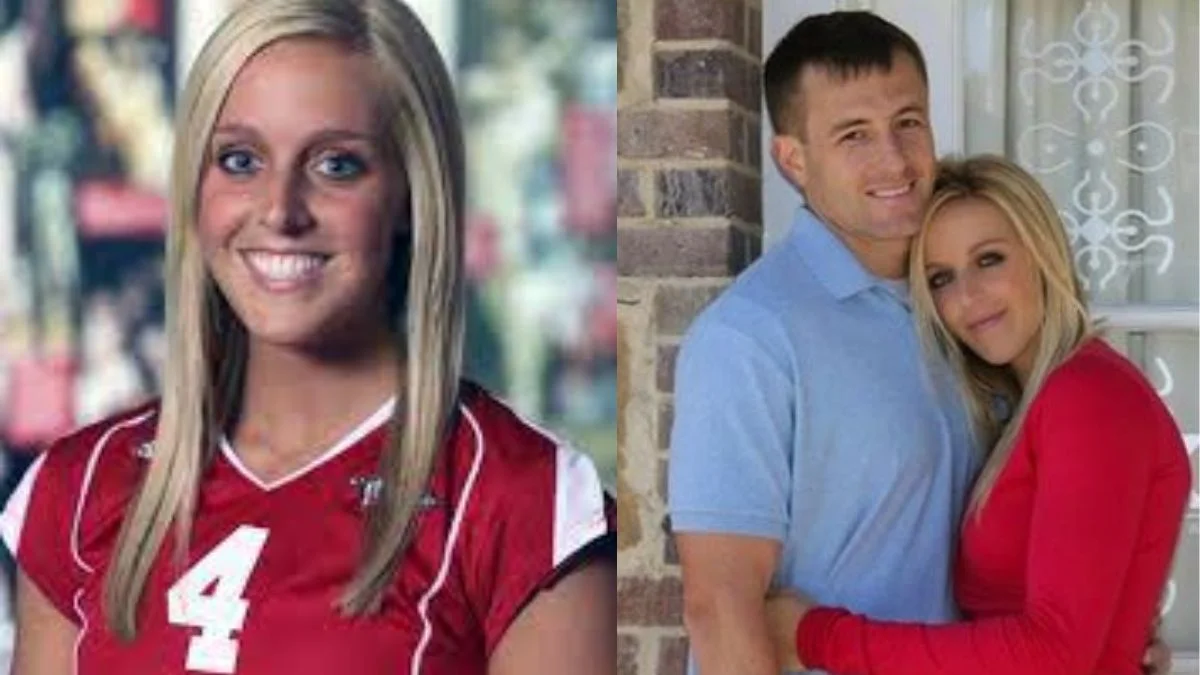The Rise, Fall, and Lessons from the Jessica Dorrell Scandal: A Deep Dive into Workplace Ethics and Public Image

1. Who is Jessica Dorrell? A Closer Look at Her Background
Jessica Dorrell, a name that became well-known in 2012, is a former student-athlete turned athletics administrator who found herself in the middle of a high-profile controversy involving her professional and personal relationship with Bobby Petrino, then-head coach of the Arkansas Razorbacks football team. But who is she beyond the headlines? Let’s take a look at her background before the scandal made her a household name.

Dorrell grew up in a sports-focused environment, excelling in athletics from an early age. She was a star athlete during her college years, playing volleyball at the University of Arkansas. Dorrell was known for her leadership, competitive spirit, and commitment to the team. After completing her degree, she transitioned from being an athlete to working in athletics administration, where she began to build her career in sports management.
Her background in athletics, combined with her networking skills, made her a natural fit for roles within university sports departments. Before the scandal broke, Dorrell had a promising career ahead of her in college athletics, but unfortunately, her personal life intertwined with her professional one in ways that would ultimately derail that trajectory.
2. The Incident: Jessica Dorrell and Bobby Petrino
The story of Jessica Dorrell became national news in April 2012 when a motorcycle accident involving Bobby Petrino, head coach of the Arkansas Razorbacks, revealed far more than a simple crash. Petrino was injured in the accident, and it was later disclosed that Jessica Dorrell, a recently hired football program staff member, was a passenger on the motorcycle. This revelation sparked an investigation that exposed a personal relationship between Petrino and Dorrell, leading to a scandal that shook the sports world.
Petrino, who was a married father of four, had been secretly involved with Dorrell, and their relationship became the subject of widespread media scrutiny. At the time, Dorrell had been hired as the Student-Athlete Development Coordinator for the Arkansas football team, a position for which she had been chosen over other qualified candidates. The nature of the hiring, combined with the personal relationship between her and Petrino, raised serious ethical concerns about favoritism and abuse of power.
The fallout was swift. Petrino initially lied about Dorrell’s presence at the accident but was forced to come clean as the investigation progressed. Ultimately, Petrino was fired from his position as head coach, and Dorrell resigned from her role within the athletics department. The scandal left a significant mark on both individuals’ careers and tarnished the reputation of the Arkansas football program.
3. The Role of the Media: How Coverage Shaped the Public Perception of Jessica Dorrell
One of the most fascinating aspects of the Jessica Dorrell scandal was how quickly and intensely the media latched onto the story. Sports media outlets, local newspapers, and national news organizations reported extensively on the affair, with many outlets focusing on the salacious details of the relationship rather than the broader ethical issues at play. The media’s portrayal of Dorrell was often sensationalized, with headlines that leaned into the scandalous nature of her relationship with Petrino.
Jessica Dorrell was depicted in various lights by the media, from a young professional caught in a complicated situation to a woman who had knowingly entered into an inappropriate relationship with her superior. The narrative often framed her as either a victim or an opportunist, depending on the outlet. This kind of polarized coverage is not uncommon in high-profile scandals, where the individuals involved become characters in a public drama rather than real people with complex lives.
In Dorrell’s case, much of the media focus was on her role as a young, attractive woman involved with a powerful, older coach. This kind of framing plays into larger societal issues surrounding women in the workplace, particularly in male-dominated fields like college athletics. While the media coverage was undoubtedly driven by public interest, it also highlighted how gender dynamics can shape the way scandals are reported and perceived.
4. Workplace Ethics and Power Dynamics: The Broader Issues Behind the Scandal
The Jessica Dorrell and Bobby Petrino scandal raised important questions about workplace ethics, particularly in environments where power dynamics are heavily skewed. In this case, Petrino, as the head coach of a major football program, held significant authority over Dorrell, who had just been hired to a key administrative role. The imbalance of power between the two created an inherently problematic situation, even before the nature of their personal relationship was revealed.
One of the key issues in this case was the question of whether Dorrell’s hiring was influenced by her relationship with Petrino. There were multiple candidates for the position she was hired for, and her selection led to accusations of favoritism and unethical behavior on Petrino’s part. This kind of situation is not unique to the sports world; similar ethical dilemmas arise in all industries when personal relationships interfere with professional decision-making.
The scandal also highlighted the importance of clear workplace policies regarding relationships between employees, particularly when one person holds a position of power over the other. Many organizations have strict policies in place to prevent situations like this from occurring, but enforcement of these policies can vary. In the case of the Arkansas football program, the lack of transparency and oversight allowed the relationship to remain hidden until it became a public issue following the motorcycle accident.
5. The Fallout: How the Scandal Affected Jessica Dorrell and Bobby Petrino’s Careers
The aftermath of the scandal was significant for both Dorrell and Petrino, though their professional paths diverged sharply following the incident. For Dorrell, the scandal effectively ended her career in college athletics. She resigned from her position with the Arkansas football program and disappeared from the public eye in the months following the incident. While it’s unclear what career path she pursued afterward, the public nature of the scandal likely made it difficult for her to continue working in the same field.
Petrino’s career, on the other hand, took a different trajectory. Despite being fired from his position at Arkansas, he eventually found his way back into coaching. After a brief hiatus, Petrino was hired as the head coach at Western Kentucky University, and later went on to coach at Louisville, where he had previously been employed. Petrino’s ability to rebound from the scandal underscores the reality that high-profile men in positions of power are often able to recover from personal and professional missteps more easily than women, particularly in male-dominated industries like sports.
The long-term effects on Dorrell’s career remain largely unknown, as she has chosen to maintain a low profile in the years following the scandal. Her experience serves as a cautionary tale about the risks of allowing personal relationships to interfere with professional responsibilities, particularly in environments where power dynamics are at play.
6. Public Relations Crises in Sports: Lessons from the Jessica Dorrell Incident
The Jessica Dorrell scandal offers important lessons about managing public relations crises, particularly in the world of sports. When the news of her relationship with Petrino broke, the University of Arkansas was thrust into the spotlight, and the university’s response to the crisis became a key factor in how the situation was ultimately resolved.
One of the most significant mistakes made by both Petrino and the university was the initial attempt to cover up the details of the relationship. Petrino’s decision to lie about Dorrell’s involvement in the motorcycle accident only deepened the crisis when the truth came to light. In situations like this, transparency is often the best course of action, as attempting to hide information can lead to further damage to an organization’s reputation.
The University of Arkansas eventually made the decision to fire Petrino, which was widely viewed as the right move given the circumstances. However, the university’s handling of the scandal in its early stages was criticized for being slow and reactive rather than proactive. In high-profile scandals, especially those involving ethical violations, organizations must act quickly and decisively to address the issue and demonstrate accountability.
For other institutions and organizations, the Dorrell-Petrino scandal serves as a reminder of the importance of having clear policies in place for handling workplace relationships and potential conflicts of interest. Additionally, it underscores the need for strong leadership during times of crisis, as the way an organization responds to scandal can have long-lasting effects on its reputation.
7. Gender Dynamics and Scandals: How Women Are Portrayed Differently in the Media
Another important aspect of the Jessica Dorrell scandal is how gender played a role in the media’s coverage and public perception of the incident. In many ways, Dorrell’s involvement in the scandal was treated differently than Petrino’s, despite the fact that both individuals were equally responsible for their actions. This disparity is not unique to this particular case; it reflects broader societal attitudes about gender and power.
In scandals involving men and women, it is often the woman who faces more intense public scrutiny and criticism. In Dorrell’s case, she was frequently depicted as the “other woman” or a seductress, while Petrino, despite being the one in the position of power, was often framed as someone who made a mistake but could be forgiven. This kind of double standard is common in media coverage of scandals,